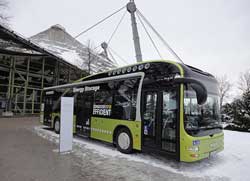Hybrid Drives Make City Buses Cleaner

Rather than powering the rear axle via an automatic transmission, as usually, the diesel engine in the Elfa system drives a generator that uses power electronics to supply electricity to one or more drive motors.
Around half of all local public transit trips in Germany are by bus. Like other heavy vehicles, however, buses are loud and produce emissions that are harmful to humans and the climate. The long-term solution is to use an all-electric drive. The problem is that today’s battery technology is relatively expensive.
Although in China, for example, there are already several buses powered by innovative lithium ion batteries. City buses make frequent stops for traffic lights and passengers, so they are well suited for use with a hybrid drive. This system marks an intermediate step on the road toward zero-emission buses powered either by batteries alone or a combination of batteries and a fuel cell system.
In the Elfa system from Siemens, the electric motors act as generators during braking and thus feed electricity back into the batteries. This power can then be subsequently used to drive the vehicle, which means at times the bus can run fully electrically and without producing any emissions. The vehicle range depends on battery capacity and can vary between a few hundred meters and several kilometers.
In combination with a clever power management system, Elfa not only reduces fuel consumption but also noise, since the diesel engine doesn’t provide acceleration and therefore operates only at quiet and economical engine speeds. As a result, fuel consumption falls by around one-third. On the basis of 60,000 kilometers a year, that corresponds to savings of around 10,000 liters of diesel, depending on the type of route driven.
Buses with Elfa drives are now being used in a number of cities worldwide, including a test fleet of double-deckers in London. Hamburg, meanwhile, is planning to introduce buses with an Elfa hybrid drive equipped with a fuel cell system rather than a diesel engine. This new drive technology is also ideal for other commercial vehicles that make frequent stops, such as garbage trucks or light delivery trucks. The Elfa system forms part of the Siemens environmental portfolio, which generated around €28 billion in sales for the company in fiscal year 2010.
Media Contact
More Information:
http://www.siemens.com/innovationnewsAll latest news from the category: Power and Electrical Engineering
This topic covers issues related to energy generation, conversion, transportation and consumption and how the industry is addressing the challenge of energy efficiency in general.
innovations-report provides in-depth and informative reports and articles on subjects ranging from wind energy, fuel cell technology, solar energy, geothermal energy, petroleum, gas, nuclear engineering, alternative energy and energy efficiency to fusion, hydrogen and superconductor technologies.
Newest articles

A universal framework for spatial biology
SpatialData is a freely accessible tool to unify and integrate data from different omics technologies accounting for spatial information, which can provide holistic insights into health and disease. Biological processes…

How complex biological processes arise
A $20 million grant from the U.S. National Science Foundation (NSF) will support the establishment and operation of the National Synthesis Center for Emergence in the Molecular and Cellular Sciences (NCEMS) at…

Airborne single-photon lidar system achieves high-resolution 3D imaging
Compact, low-power system opens doors for photon-efficient drone and satellite-based environmental monitoring and mapping. Researchers have developed a compact and lightweight single-photon airborne lidar system that can acquire high-resolution 3D…





















